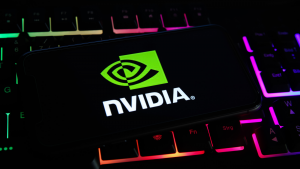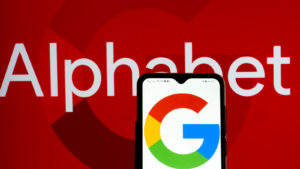With Apple’s so-called spatial computer now available in select markets outside of the U.S., questions linger about who the costly $3,500 product is for. With such a hefty price tag, which doesn’t even include prescription lenses for the many of us with glasses, questions linger as to whether augmented reality as it exists today was meant for everyday iPhone-using consumers.
It’s easy to dismiss Vision Pro due to its price and a lack of big-budget immersive video games. However, I think the real opportunity for Vision Pro 1.0 lies in the workplace. It’s a productivity device first and an entertainment device second, in my opinion.
Apple (AAPL)

Though there’s a lot of cool stuff on the Vision Pro App Store, there’s no “killer app” (think social-media apps for the iPhone back in 2008) to convince us to rack up close to $4,000 on our credit cards.
For Apple users, the price tag doesn’t make much sense, especially since the value proposition stands to get better over the next couple of years. Slowing Vision Pro new app releases is also discouraging for consumers.
In essence, Vision Pro is a nice-to-have for consumers. However, for enterprise clients seeking to save money by visualizing a prototype before it’s physically built, Vision Pro may be a device that pays for itself and then some. If you can put yourself in the shoes of an enterprise customer seeking to save money in the design process, Vision Pro becomes less of a dud and more of a game-changer for numerous industries.
With that in mind, AAPL stock may have much more going for it than Apple Intelligence in 2025 and beyond.
Nvidia (NVDA)

Speaking of video games, that’s pretty much how AI darling Nvidia (NASDAQ:NVDA) got its start, selling GPUs to PC gamers. Fast forward to today, and gaming comes second to AI. The company wasn’t just fortunate enough to be in the right place at the right time, though. Nvidia saw the AI boom coming from miles away.
Despite Nvidia’s gaming background, the company seems to be betting big on mixed reality in industry settings. Aside from being an AI king, Nvidia also offers a great augmented reality workplace stock.
Nvidia’s Omniverse platform provides a profound mixed-reality technology that could become standard across numerous workplaces in the future. The company’s digital twins (physical representations of real-world objects with accurate physics) tech can help workplaces spot defects and inefficiencies in a system before it’s built.
Though gaming is still important to Nvidia, enterprise customers have the deep pockets to spend on nascent technologies. They also gain competitive advantages and cost savings by adopting new tech sooner rather than later.
If Nvidia ends up as the augmented reality, robotics, and AI leader, perhaps NVDA stock is a bargain despite the euphoric rally.
Alphabet (GOOG, GOOGL)

The magnificent $2.2 trillion AI firm Alphabet (NASDAQ:GOOG, GOOGL) has done a fantastic job executing its AI plans. As a more obvious AI stock, though, Alphabet may need to embrace other emerging technologies (most notably augmented reality) if it’s to keep its strong momentum going for another year.
At 28.25 times trailing price-to-earnings, GOOG stock is getting a bit expensive, even if it’s one of the AI and cloud leaders right now. Recently, the AI giant reportedly made some changes to its augmented reality teams. Of course, the company’s perception remains that it shelved such projects following the brutal launch of Google Glass.
With the firm rumored to be bringing back a pair of augmented reality glasses named Iris, questions linger as to whether Alphabet is ready to get serious about mixed reality. Perhaps Alphabet would stand better served by going after the enterprise customer before everyday consumers if it’s to make its future devices “stick.” Given Google’s knack for pulling the plug on projects, however, GOOG stock stands out as less of an augmented reality workplace stock than Apple or Nvidia.
Either way, mixed reality, like AI, could be a technology that nearly every technological innovator must invest in.
On the date of publication, Joey Frenette held shares of Apple and Alphabet (Class C). The opinions expressed in this article are those of the writer, subject to the InvestorPlace.com Publishing Guidelines.
On the date of publication, the responsible editor did not have (either directly or indirectly) any positions in the securities mentioned in this article.
Joey Frenette is a seasoned investment writer specializing in technology and consumer stocks. Contributing to the Motley Fool Canada, TipRanks, and Barchart, Joey excels in spotting mispriced stocks with long-term growth potential in a fast-paced market.
